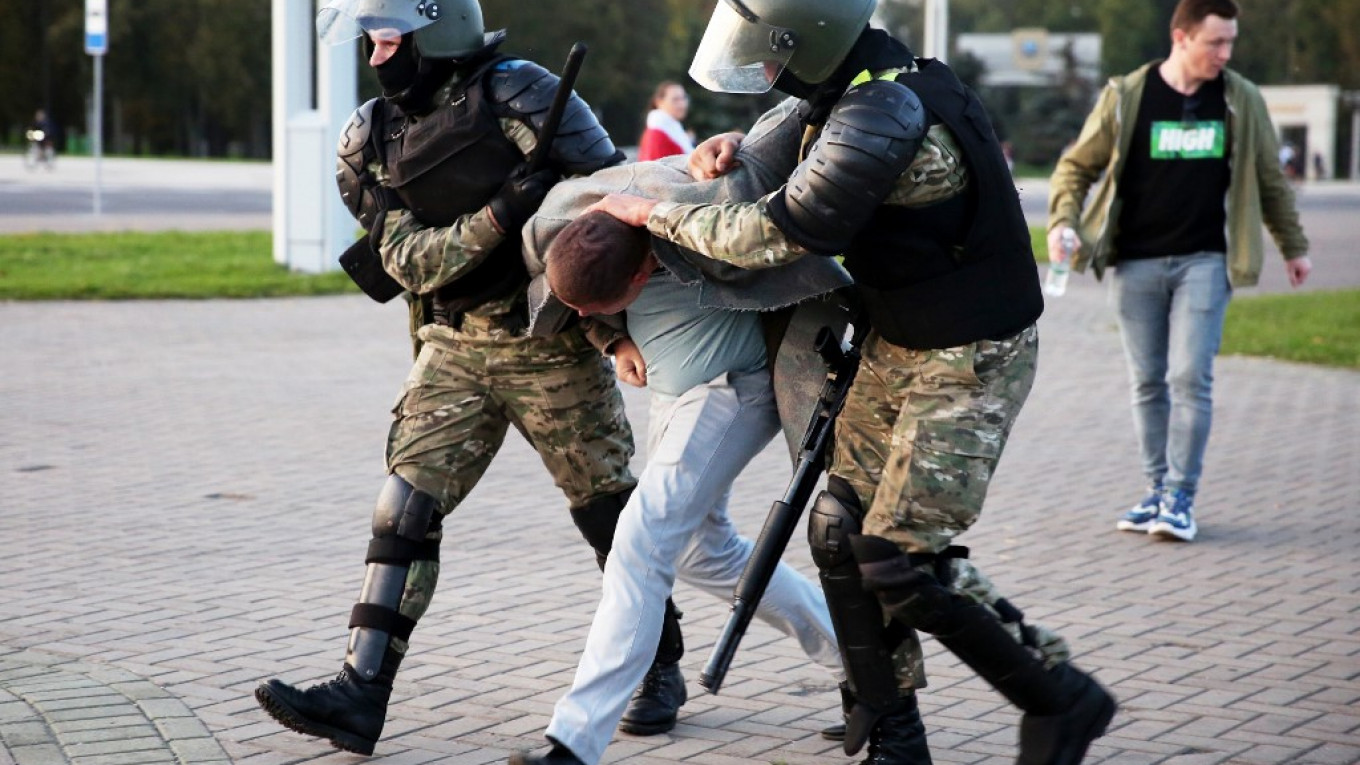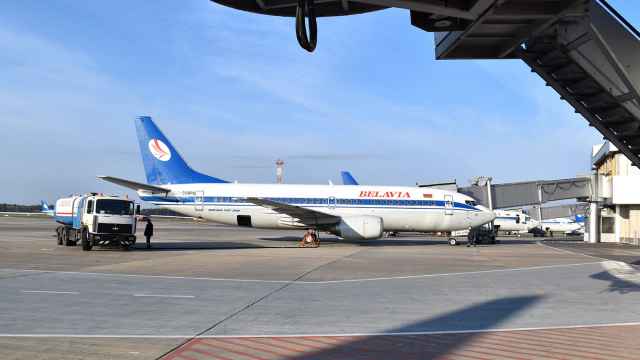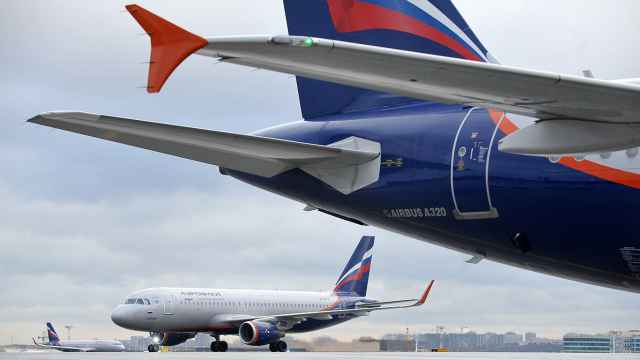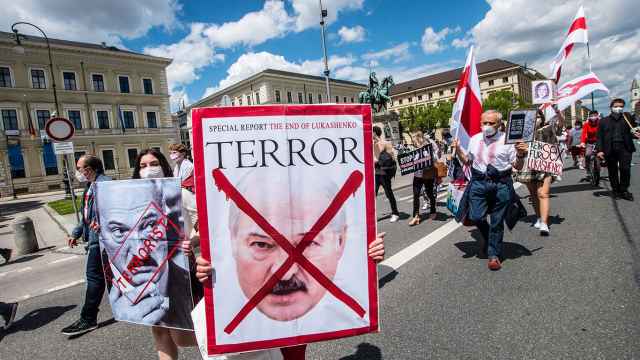Belarus police fired tear gas and arrested more than 150 protesters on Wednesday after the secret inauguration of President Alexander Lukashenko triggered new demonstrations and fresh condemnation in the West.
Several thousand protesters, many carrying the red-and white opposition flag, took to the streets of the capital Minsk and other cities following a surprise announcement that Lukashenko had been sworn into a sixth term in office following disputed elections in August.
Clashes between masked riot police and protesters broke out in Minsk, with the Viasna rights group saying that more than 150 people had been arrested in the capital, as well as the southwestern city of Brest and other places.
Several European countries including Germany and the United States responded to Lukashenko's inauguration by refusing to recognize him as the president of the ex-Soviet state.
"The announced results were fraudulent and did not convey legitimacy," a State Department spokesperson said in Washington. "The United States cannot consider Alexander Lukashenko the legitimately elected leader of Belarus."
The state-run Belta news agency broke the news that Lukashenko had "taken office as President of Belarus" during a ceremony in the Palace of Independence on Wednesday.
It was not shown live on television unlike previous ceremonies, but Belta published photographs of the mustachioed leader swearing the oath of allegiance at a podium in a blue suit with his hand on a copy of the Constitution.
"I can't, I don't have the right to abandon Belarusians," Lukashenko said in his inaugural address according to a transcript of his remarks later released by his office.
He blamed the mass protests since August, which have seen tens of thousands take to the streets, on "disorientation of society" and thanked law enforcement for showing "firmness."
Lukashenko said he and his allies had "prevented a catastrophe," though the ceremony in front of 700 guests drew mockery from critics.
"If the inauguration had been announced in advance, 200,000 demonstrators would have gathered outside his palace," said Ales Belyatsky, head of the Viasna rights group.
"Where are the rejoicing citizens? Where is the diplomatic corps?" questioned opposition activist and former minister Pavel Latushko on social media.
'Such a farce'
On Wednesday evening, several thousand protesters took to the streets, with some chanting "Long live Belarus" and others wearing cardboard crowns.
Many derided the 66-year-old, who has been in power since 1994.
"I had my cat sworn in today," read one placard.
Video and pictures released by Tut.by, an independent Belarusian outlet, showed riot police violently dispersing protesters who yelled "fascists" while some demonstrators including women had bloodied faces.
Tear gas was used during scuffles between police and protesters.
Earlier in the day Lukashenko's opposition rival Svetlana Tikhanovskaya reiterated her claim to be the true winner of the elections, saying the "so-called inauguration is of course a farce."
Diplomatic reaction in Western capitals was swift.
Germany does not recognize Lukashenko as president of Belarus, said government spokesman, Steffen Seibert, adding his re-election lacked "democratic legitimacy."
Others including the Slovak Foreign Minister Ivan Korcok and Danish counterpart Jeppe Kofod made similar statements, as did the Baltic states, the Netherlands and the Czech Republic.
"Such a farce. Forged elections. Forged inauguration," tweeted Lithuanian Foreign Minister Linas Linkevicius.
There was no immediate comment from Russia, Lukashenko's biggest financial and diplomatic backer.
Russian President Vladimir Putin has promised law enforcement backup if needed, as well as a $1.5 billion loan.
Lukashenko vowed to stick closer to "elder brother" Moscow during one-to-one talks at the Russian president's residence in the Black Sea resort of Sochi in mid-September.
Putin has long urged full unification between Russia and Belarus, while Lukashenko has so far ruled this out.
Mass detentions
Over the past month riot police have detained thousands of protesters who have reported torture and abuse in custody, prompting international condemnation and proposed EU sanctions.
Lukashenko's rival Tikhanovskaya has taken shelter in EU member Lithuania, while he has jailed or driven out other key opposition figures.
European Union foreign ministers on Monday failed to agree sanctions over the political crisis.
A Message from The Moscow Times:
Dear readers,
We are facing unprecedented challenges. Russia's Prosecutor General's Office has designated The Moscow Times as an "undesirable" organization, criminalizing our work and putting our staff at risk of prosecution. This follows our earlier unjust labeling as a "foreign agent."
These actions are direct attempts to silence independent journalism in Russia. The authorities claim our work "discredits the decisions of the Russian leadership." We see things differently: we strive to provide accurate, unbiased reporting on Russia.
We, the journalists of The Moscow Times, refuse to be silenced. But to continue our work, we need your help.
Your support, no matter how small, makes a world of difference. If you can, please support us monthly starting from just $2. It's quick to set up, and every contribution makes a significant impact.
By supporting The Moscow Times, you're defending open, independent journalism in the face of repression. Thank you for standing with us.
Remind me later.






